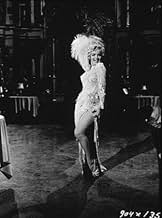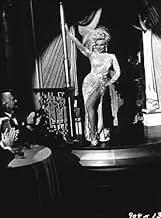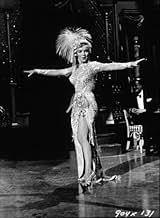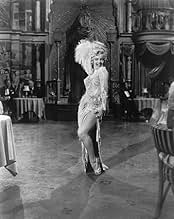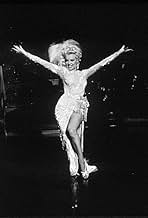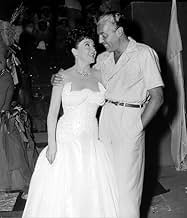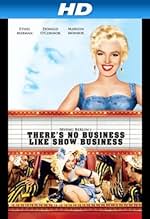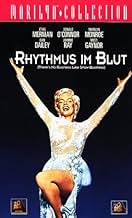CALIFICACIÓN DE IMDb
6.4/10
7.1 k
TU CALIFICACIÓN
Molly y Terry Donahue, además de sus tres hijos, son Los Cinco Donahue. Tim conoce a la chica del guardarropa Vicky y su familia comienza a desmoronarse.Molly y Terry Donahue, además de sus tres hijos, son Los Cinco Donahue. Tim conoce a la chica del guardarropa Vicky y su familia comienza a desmoronarse.Molly y Terry Donahue, además de sus tres hijos, son Los Cinco Donahue. Tim conoce a la chica del guardarropa Vicky y su familia comienza a desmoronarse.
- Dirección
- Guionistas
- Elenco
- Nominado a 3 premios Óscar
- 4 nominaciones en total
Dorothy Abbott
- Showgirl
- (sin créditos)
Dorothy Adams
- Nurse
- (sin créditos)
Robert Adler
- Night Watchman
- (sin créditos)
Aladdin
- Orchestra Violinist
- (sin créditos)
Fred Aldrich
- Private Detective
- (sin créditos)
- Dirección
- Guionistas
- Todo el elenco y el equipo
- Producción, taquilla y más en IMDbPro
Opiniones destacadas
The first time you watch this movie, you'll think it's long, boring, and stupid. The second time you watch this movie, you'll love it. I can't begin to tell you why, but it's the truth. (I had the chance to show this film to an audience during a Donald O'Connor film festival. People came up to me weeks later to say that they had caught it again on cable, and loved it the second time through.)
Marilyn is definately "ehh". This movie was filmed during her worst years of personal abuses, and it shows all over her face and her work, lending a shadowy sadness to her character for modern audiences. Donald O'Connor's character also takes on a new depth for modern viewers familiar with his own life's history, oftentimes with a sharp poignance that helps him grab control of so many scenes, and turn his character's story into the strongest sub-plot of the film.
Merman is BRILLIANT as the real head of this family, giving us a wonderfully unique character. Her role as the strong, smart, powerful, and loving mother is truly a standout for the 50's in general, and musicals in particular.
Marilyn is definately "ehh". This movie was filmed during her worst years of personal abuses, and it shows all over her face and her work, lending a shadowy sadness to her character for modern audiences. Donald O'Connor's character also takes on a new depth for modern viewers familiar with his own life's history, oftentimes with a sharp poignance that helps him grab control of so many scenes, and turn his character's story into the strongest sub-plot of the film.
Merman is BRILLIANT as the real head of this family, giving us a wonderfully unique character. Her role as the strong, smart, powerful, and loving mother is truly a standout for the 50's in general, and musicals in particular.
this is a film for people who love big song and dance numbers (as well as Marilyn Monroe and Mitzi Gaynor fans). it almost is 'pre- reminiscent' of Bollywood in how it moves from one song to the next, with only the most meager connections between song and storyline. the storyline itself is thin enough, that in slow moments i was struck by how contrived the plot was. the purpose of this movie seemed to be to have several Irving Berlin songs choreographed into vaudeville-like song and dance numbers. what better way to do this than by following the lives of a couple of old vaudeville stars who met, married, had babies, and stayed on the road all the while. it all leads to the climactic scene (here's the spoiler, if this film can be said to have one) of ethel merman paying homage to herself and her role as Annie Oakley by singing 'there's no business like show business'. pay attention to how they managed to jigger the storyline such that ethel got her solo for that number (remembering that the family had five members plus a confounding love interest at that point, and the script writers had to somehow get all of them but ethel off the stage). another number, where johnny ray sings a gospel tune, has 'vehicle' written all over it. and as mentioned by the reviewer above, Marilyn Monroe was hot enough property that she was given two 'vehicle' numbers--although her character does not appear to have been penciled into an otherwise completed script, as suggested above. Marilyn's character is critical to the unfolding of the plot, such as it is. notice also how the script writers cleverly played upon Marilyn's reputation for a breathy, contrived diction.
so if you like BIG musicals with huge song and dance production numbers and little plot, this is for you (9 or 10 stars). if you do not, skip this one (1 or 2 stars, this is a bomb). averaged out to about a 6, but really more likely a 'love it' or 'hate it' movie. but then again . . .
there was something in the 'exposed ducts' construction that made me curious enough about how and why it was made the way it was, that i looked up the answers to many of my questions. were the songs composed specifically for this, or a jumble of odds and ends? (the latter). why was ethel merman given the climatic solo? (as mentioned, she was reprising a big number from her signature role as Annie Oakley in 'Annie Get Your Gun', which was one of the most successful Broadway shows ever at the time). who was that guy who played Steve Donahue, and please explain the strange juxtaposition of his commanding stage presence when singing, and that effete concealment of androgyny when not--as well as the 'cast-to-type' plot twist that sends him into the clergy . . . ? (look up a biography of johnny ray). so, if you want a peek into the movie-making process at the tail end of the studio-system era, this movie has a barely concealed super-structure that reveals how a hoped-for 'blockbuster' was constructed in those days.
so if you like BIG musicals with huge song and dance production numbers and little plot, this is for you (9 or 10 stars). if you do not, skip this one (1 or 2 stars, this is a bomb). averaged out to about a 6, but really more likely a 'love it' or 'hate it' movie. but then again . . .
there was something in the 'exposed ducts' construction that made me curious enough about how and why it was made the way it was, that i looked up the answers to many of my questions. were the songs composed specifically for this, or a jumble of odds and ends? (the latter). why was ethel merman given the climatic solo? (as mentioned, she was reprising a big number from her signature role as Annie Oakley in 'Annie Get Your Gun', which was one of the most successful Broadway shows ever at the time). who was that guy who played Steve Donahue, and please explain the strange juxtaposition of his commanding stage presence when singing, and that effete concealment of androgyny when not--as well as the 'cast-to-type' plot twist that sends him into the clergy . . . ? (look up a biography of johnny ray). so, if you want a peek into the movie-making process at the tail end of the studio-system era, this movie has a barely concealed super-structure that reveals how a hoped-for 'blockbuster' was constructed in those days.
20th Century Fox was no match for MGM when it came to musicals. Daryl F. Zanuk decided to gamble with this film where the talents of a Broadway star, Ethel Merman, would be showcased. Ms. Merman in spite of being the toast of Broadway, never made it big in Hollywood. After all, she was not a radiant beauty, but oh, could she belt a song that could be heard at the top of the balcony! Phoebe and Henry Ephron were brought on board to write the screen treatment and Walter Lang directed.
The musical was also blessed in that Irving Berlin's music is heard throughout in all its glory. Ms. Merman was the perfect actress to interpret the songs written by Mr. Berlin. They made a perfect duo, even though, for some viewers not used to Ethel Merman's singing style, it might prove an uneasy combination.
The story is simple enough. It follows the Donahues from the early days of vaudeville through some glittering years after. Molly and Terence Donahue had two sons, Tim and Steve, and a daughter, Katy. As the children grow up, the parents' popularity began to recede. The film deals with Tim, as a young man, as he falls for Vicky Parker, a beautiful singer who makes it big on her own. Vickie, who is more interested in her own career neglects Tim. As a result, Tim goes on his own to find himself, away from his family and Vickie.
The best thing in the film is Ethel Merman. She was a legendary figure and as Molly Donahue, she is at her best. Dan Dailey was the perfect partner for Ms. Merman. Donald O'Connor is also seen doing some fine dancing. Marilyn Monroe was a lovely woman to look at. As a singer, she had a small voice, but she used it well making the songs her own. Mitzi Gaynor plays Katy. Johnnie Ray, a popular singer of that period is terribly miscast. His Steve is the worst thing in the movie.
Although predictable, this film has some great things going for it. Some of the musical numbers are well staged and will not disappoint. On the whole as the camaraderie expressed by the title of the film is evident in the musical.
The musical was also blessed in that Irving Berlin's music is heard throughout in all its glory. Ms. Merman was the perfect actress to interpret the songs written by Mr. Berlin. They made a perfect duo, even though, for some viewers not used to Ethel Merman's singing style, it might prove an uneasy combination.
The story is simple enough. It follows the Donahues from the early days of vaudeville through some glittering years after. Molly and Terence Donahue had two sons, Tim and Steve, and a daughter, Katy. As the children grow up, the parents' popularity began to recede. The film deals with Tim, as a young man, as he falls for Vicky Parker, a beautiful singer who makes it big on her own. Vickie, who is more interested in her own career neglects Tim. As a result, Tim goes on his own to find himself, away from his family and Vickie.
The best thing in the film is Ethel Merman. She was a legendary figure and as Molly Donahue, she is at her best. Dan Dailey was the perfect partner for Ms. Merman. Donald O'Connor is also seen doing some fine dancing. Marilyn Monroe was a lovely woman to look at. As a singer, she had a small voice, but she used it well making the songs her own. Mitzi Gaynor plays Katy. Johnnie Ray, a popular singer of that period is terribly miscast. His Steve is the worst thing in the movie.
Although predictable, this film has some great things going for it. Some of the musical numbers are well staged and will not disappoint. On the whole as the camaraderie expressed by the title of the film is evident in the musical.
There's No Business Like Show Business has the distinction of being the last of the Irving Berlin songbook musicals filmed. It came out the same year as White Christmas, also of the same genre.
Take a listen to the background music of films like Holiday Inn, Blue Skies, Alexander's Ragtime Band, and this one. I defy you to find one non-Berlin note in the film and that's no accident. The more songs of Irving Berlin used, the more money he made. He was one shrewd businessman Irving, most of the time.
The title song is identified with Ethel Merman and it was introduced in Annie Get Your Gun. Merman like Mary Martin had a conspicuous lack of success in Hollywood as much as she was an icon on Broadway. She only did the screen version of two of her Broadway hits, Anything Goes and Call Me Madam. That's two more than Mary Martin did.
Anyway, I think the genesis of There's No Business Like Show Business probably came about when Call Me Madam became such a hit and the movie money people saw how the chemistry was between her and Donald O'Connor. So O'Connor was signed to play one of her three children. The other two children were Johnnie Ray and Mitzi Gaynor.
The plot such as it is, is the story of the Donahue family between both World Wars. The father of the aforementioned children is Dan Dailey and he and Merman do some good Irving Berlin numbers together. I've always marvelled at how graceful Dan Dailey moved on the screen in his musical films. He was not a creative sort in the same way Fred Astaire or Gene Kelly were. Probably if he had been, his reputation would be higher today. But he was a pleasing entertainer every time you saw him.
By all accounts it wasn't a happy film for Ethel. Marilyn Monroe is in the film and Ethel was jealous of her. Not that Monroe wasn't her usual difficult self. Probably that helped the plot because it does call for the two to be at odds. Merman believes that Monroe has led Donald O'Connor astray.
Mitzi Gaynor was a wonderful talent as well. Too bad she wasn't born twenty years earlier, what a big star she would have been in the thirties and forties in Hollywood musicals then. Good singer and one fabulous dancer.
The plot does get kind of sticky in spots and Johnnie Ray didn't set the screen on fire when he wasn't singing. No accident he didn't become a film star.
Still for those of us who bless the day Irving Berlin put down his first notes of an original song, it's worth watching.
Take a listen to the background music of films like Holiday Inn, Blue Skies, Alexander's Ragtime Band, and this one. I defy you to find one non-Berlin note in the film and that's no accident. The more songs of Irving Berlin used, the more money he made. He was one shrewd businessman Irving, most of the time.
The title song is identified with Ethel Merman and it was introduced in Annie Get Your Gun. Merman like Mary Martin had a conspicuous lack of success in Hollywood as much as she was an icon on Broadway. She only did the screen version of two of her Broadway hits, Anything Goes and Call Me Madam. That's two more than Mary Martin did.
Anyway, I think the genesis of There's No Business Like Show Business probably came about when Call Me Madam became such a hit and the movie money people saw how the chemistry was between her and Donald O'Connor. So O'Connor was signed to play one of her three children. The other two children were Johnnie Ray and Mitzi Gaynor.
The plot such as it is, is the story of the Donahue family between both World Wars. The father of the aforementioned children is Dan Dailey and he and Merman do some good Irving Berlin numbers together. I've always marvelled at how graceful Dan Dailey moved on the screen in his musical films. He was not a creative sort in the same way Fred Astaire or Gene Kelly were. Probably if he had been, his reputation would be higher today. But he was a pleasing entertainer every time you saw him.
By all accounts it wasn't a happy film for Ethel. Marilyn Monroe is in the film and Ethel was jealous of her. Not that Monroe wasn't her usual difficult self. Probably that helped the plot because it does call for the two to be at odds. Merman believes that Monroe has led Donald O'Connor astray.
Mitzi Gaynor was a wonderful talent as well. Too bad she wasn't born twenty years earlier, what a big star she would have been in the thirties and forties in Hollywood musicals then. Good singer and one fabulous dancer.
The plot does get kind of sticky in spots and Johnnie Ray didn't set the screen on fire when he wasn't singing. No accident he didn't become a film star.
Still for those of us who bless the day Irving Berlin put down his first notes of an original song, it's worth watching.
This CinemaScope musical follows the lives and loves of the Donahues, a family of vaudeville performers: father Terrance (Dan Dailey), mother Molly (Ethel Merman), elder son Tim (Donald O'Connor), daughter Katy (Mitzi Gaynor), and younger son Steve (Johnnie Ray). They persevere through changing tastes, the stock market crash, and the start of WW2. Tim falls for co-star Vicky (Marilyn Monroe), while Katy finds romance with writer Charles (Hugh O'Brian), and Steve pursues a different calling.
The threadbare story merely serves to connect a series of elaborate musical numbers designed to make the best of the new widescreen CinemaScope format. Director Lang and choreographer Robert Alton turn in some excellent work, and Donald O'Connor reportedly called this his favorite of his films (over Singin' in the Rain?!?). I watched this for Monroe, who doesn't impress much here. She supposedly didn't want to appear in this, but did so in order to win the lead in The Seven Year Itch. This was one of Fox's most expensive productions to date, and despite selling a lot of tickets, it ended up being a money-loser. It earned Oscar nominations for (inexplicably) Best Story (Lamar Trotti), Best Score (Alfred & Lionel Newman), and Best Color Costumes (Charles Le Maire, Miles White, Travilla).
The threadbare story merely serves to connect a series of elaborate musical numbers designed to make the best of the new widescreen CinemaScope format. Director Lang and choreographer Robert Alton turn in some excellent work, and Donald O'Connor reportedly called this his favorite of his films (over Singin' in the Rain?!?). I watched this for Monroe, who doesn't impress much here. She supposedly didn't want to appear in this, but did so in order to win the lead in The Seven Year Itch. This was one of Fox's most expensive productions to date, and despite selling a lot of tickets, it ended up being a money-loser. It earned Oscar nominations for (inexplicably) Best Story (Lamar Trotti), Best Score (Alfred & Lionel Newman), and Best Color Costumes (Charles Le Maire, Miles White, Travilla).
¿Sabías que…?
- TriviaOne day, Marilyn Monroe's husband, Joe DiMaggio, visited the set. He refused to be photographed with Monroe, but insisted on being photographed with Ethel Merman, whom he called "my favorite star."
- ErroresDuring the "Heat Wave" number, Marilyn Monroe accidentally pokes her finger in the eye of a dancer standing between the branches of a prop tree.
- Citas
Molly Donahue: "Don't worry." Hmm. That's a laugh. You start worrying about your kids the day they're born and you never stop. Even after they bury you, I bet you never stop.
- ConexionesFeatured in Marilyn (1963)
- Bandas sonorasWhen the Midnight Choo-Choo Leaves for Alabam'
(uncredited)
Written by Irving Berlin
Performed by Ethel Merman and Dan Dailey
Later performed by Mitzi Gaynor and Donald O'Connor
Selecciones populares
Inicia sesión para calificar y agrega a la lista de videos para obtener recomendaciones personalizadas
- How long is There's No Business Like Show Business?Con tecnología de Alexa
Detalles
- Fecha de lanzamiento
- País de origen
- Idiomas
- También se conoce como
- There's No Business Like Show Business
- Locaciones de filmación
- Productora
- Ver más créditos de la compañía en IMDbPro
Taquilla
- Total a nivel mundial
- USD 6,341
- Tiempo de ejecución1 hora 57 minutos
- Color
- Relación de aspecto
- 2.55 : 1
Contribuir a esta página
Sugiere una edición o agrega el contenido que falta

Principales brechas de datos
By what name was El mundo de la fantasía (1954) officially released in India in English?
Responda


